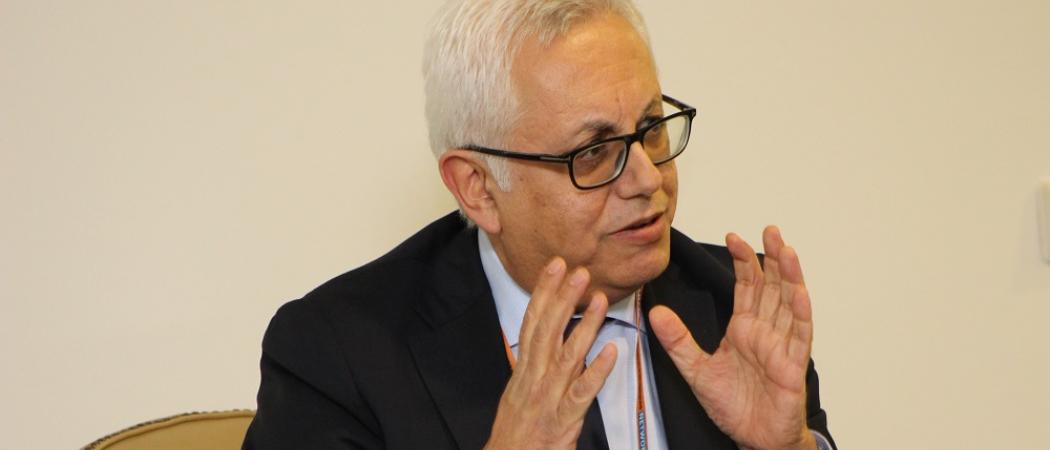‘We’re serious’ about competing with US and China in new digital technologies, says top EU official at Science|Business event

Khalil Rouhana, deputy director general for digital affairs at the European Commission.
The €9.2 billion Digital Europe programme will put the EU in a “better position” than the US and China in high-performance computing (HPC), according to a senior European Commission official.
"We're moving to a scale that will enable us to compete on a global scale. Really, we’re serious about it,” Khalil Rouhana, deputy director general for digital affairs, told an event organised by Science|Business to discuss the scope and ambitions of the EU’s proposed investments in digital technologies.
The Digital Europe programme will see the Commission and member states commit joint resources to procure high tech infrastructure for use throughout the EU, in five areas of supercomputing, artificial intelligence (AI), cybersecurity, digital skills, and digital transformation.
The last item refers to promoting wider use of high tech infrastructure by the public sector and setting up innovation hubs where small businesses can access these new technologies.
A total of €2.7 billion, the biggest share of the budget, will be spent on supercomputers. With matched funding from member states, Rouhana said that, “would put us in even better situation than competing regions [for which read the US and China] in terms of investment in supercomputing.”
Europe has a way to go if it is to outpace these rivals. As of last November, 227 of the world’s 500 fastest supercomputers were in China and 109 in the US. The UK had 20, France 18, Germany 17, Ireland 12, and Italy six. In total, ninety two of the 500 most powerful machines are in Europe
Of the rest of the budget, the Commission is proposing to spend €2.5 billion on AI, €2 billion on cybersecurity, €700 million on digital skills, and €1.3 billion on digital transformation. This is in addition to funds member states are expected to invest.
Capacity building
While the much larger Horizon Europe programme supports research across the board, Digital Europe will procure high tech resources and skills for use by European businesses and the public sector. “This is capacities building, it's not research and innovation,” Rouhana said.
The €2.7 billion for high performance computing will come from a recently established joint undertaking with industry, EuroHPC, which will also receive separate funding from the Horizon Europe programme. “The ambition is that we will extend that joint undertaking for the management of the budget that is foreseen in the Digital Europe programme,” said Rouhana.
Restricting access
With the exception of cybersecurity, the Commission originally wanted Digital Europe to be open to third countries outside the EU, and in particular those covered by the European Neighbourhood Policy. But last year, MEPs voted to remove all mention of the ENP and expand the list of criteria third countries must meet in order to participate.
Rouhana said the Commission’s approach was not about opening up Digital Europe specifically, but rather keeping the access rules consistent with other programs, such as Horizon Europe. “We started with our general policy of openness for all the programmes,” he said, noting the European Council takes a less restrictive view than the parliament. “We’ll see where the trialogue will lead us,” said Rouhana.
The decision by the parliament was a compromise, because some MEPs wanted to prohibit third country access altogether.
The challenge is to find a policy that builds Europe’s capacities at the same time as attracting scientists from other parts of the world, Austrian conservative MEP Paul Rübig told the Science|Business event. “The truth is that we support the brain gain into Europe, so how can we make Europe more attractive for the scientists?” Rübig said.
Winning the quantum race?
Europe may be lagging behind in the league table of the world’s 500 fastest supercomputers, but Rouhana claimed the EU is beating the US and China when it comes to spending on quantum computing research. “Very important investments have been done in quantum technology, despite what you hear in the press and [elsewhere].” The statistics show investment in research and development in quantum in Europe is higher than the US and China, Rouhana said.
The assertion is based on estimates by market analysts McKinsey that in 2015, global non-classified investments in quantum computing were €1.5 billion, of which €550 million came from the EU, €360 million from the US, and €220 million from China.
But accurate figures on how much is spent on quantum computing in the US and China are hard to come by: both governments have classified programmes and there is significant investment by the private sector.
In 2017, China announced a €8.7 billion investment in the National Laboratory for Quantum Information Services, and at the end of last year, US president Donald Trump signed the National Quantum Initiative Act, which over 2019 - 2023 will provide up to €1.1 billion on top of existing spending.
In comparison, the Commission has promised to spend €1 billion on quantum computing over ten years. The first €132 million of that was released in November, in the face of criticism the funds will be spread too thinly across too many projects, while the US plan is more focused.



 A unique international forum for public research organisations and companies to connect their external engagement with strategic interests around their R&D system.
A unique international forum for public research organisations and companies to connect their external engagement with strategic interests around their R&D system.